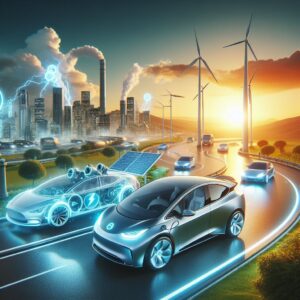The automotive industry is undergoing a transformative evolution, pivoting towards sustainable transportation solutions to combat environmental concerns. Zero-emission vehicles, particularly electric and hydrogen cars, stand at the forefront of this revolution.

Electric Cars: Pioneering the Shift
Electric vehicles (EVs) have emerged as a beacon of eco-conscious transportation. These cars, powered by electric motors and batteries, produce zero tailpipe emissions, mitigating the harmful environmental impact associated with traditional internal combustion engines. The increasing affordability, enhanced driving range, and expanding charging infrastructure are propelling the adoption of electric cars.
Hydrogen Cars: Unleashing Sustainable Potential
Hydrogen-powered vehicles, though less prevalent, offer another promising avenue for sustainable mobility. Fuel cell electric vehicles (FCEVs) utilize hydrogen to generate electricity, emitting only water vapor as a byproduct. While hydrogen infrastructure and production remain in nascent stages, advancements in technology and collaborative efforts in research aim to unlock the full potential of hydrogen cars.
Advantages and Challenges
Zero-emission vehicles boast several advantages beyond environmental benefits. They offer quieter rides, lower operating costs, and reduced reliance on fossil fuels, contributing to energy diversification and reducing dependence on non-renewable resources. However, challenges such as high initial costs, limited infrastructure.
The Path Forward: Accelerating Sustainable Mobility
The future of transportation hinges on the continued evolution and adoption of zero-emission vehicles. The automotive industry’s commitment to innovation, coupled with government incentives and growing consumer awareness, propels the momentum towards a zero-emission future. Investments in research, infrastructure development.
The paradigm shift towards zero-emission vehicles, particularly electric and hydrogen cars, is reshaping the landscape of transportation. Electric vehicles (EVs) have emerged as a frontrunner in this revolution. Their mainstream acceptance, bolstered by technological advancements and an expanding charging infrastructure, signifies a seismic change towards cleaner transportation options. Simultaneously, hydrogen-powered vehicles, while in their infancy, exhibit tremendous potential in unlocking emission-free mobility.

These zero-emission vehicles represent more than just a shift in technology; they embody a commitment to mitigating the adverse environmental impact of transportation.
As the world strives towards decarbonization and sustainability, zero-emission vehicles stand as catalysts for change. The future of mobility hinges on collaborative innovation, technological advancements, and proactive policies aimed at incentivizing cleaner transportation alternatives. With investments in research, infrastructure, and consumer education, the automotive industry can expedite the transition towards a zero-emission future.
Conclusion:
Zero-emission vehicles represent a watershed moment in the automotive landscape, offering a glimpse into a future where mobility aligns harmoniously with environmental preservation. As electric and hydrogen cars pave the way for emission-free transportation, their growing presence underscores a collective commitment to sustainable practices.
For more Article like this, visit our Website Here
